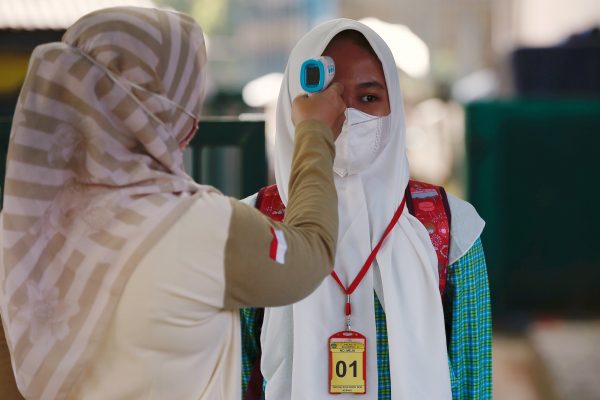Yet the vaccine rollout has been slow and disorganised. As of 11 May 2021, 13.68 million Indonesians have received their first dose, and just under 9 million have received both doses of either the Sinovac or AstraZeneca vaccines offered in the country. This means only about 5 per cent of eligible individuals are fully vaccinated.
Among priority groups, the highest vaccination rates were observed among health workers, of whom 93.1 per cent have been vaccinated, followed by public officials at 33 per cent. While the elderly population is rightly included as a priority group, the vaccination rate for this most vulnerable group is disappointing with only 8.43 per cent receiving both doses so far.
Estimates suggest that with an average of 60,433 doses administered daily, Indonesia would take over 10 years to vaccinate 75 per cent of its population. Although this is based on a linear assumption and discounts the effects of an accelerating rollout, it flags the urgent need to formulate multifaceted approaches to boost Indonesia’s vaccination rates.
The slow progress of COVID-19 vaccination in Indonesia can be put down to limited global vaccine supply, the unpreparedness of the national health system and vaccine hesitancy. The global capacity to manufacture vaccines remains limited: to cover 70 per cent of the global population, at least 11 billion doses are required. This need simply cannot be met by the manufacturers immediately.
‘Vaccine nationalism’ from high-income countries also poses a great challenge for low- and middle-income countries, including Indonesia, in securing enough doses for their populations. High-income countries have acquired 77 per cent of Pfizer’s, 27 per cent of AstraZeneca’s and 18 per cent of Sinovac’s 2021 COVID-19 vaccine production capacity. By June 2021, Indonesia expects to have secured around 80 million doses of Sinovac and AstraZeneca to cover 40 million of the most at-risk citizens. But this only accounts for 22 per cent of the total population eligible for vaccination.
Once these doses are on the ground, effectively administering them will require a robust health system marked by good supply chain management, information systems and service provision. Indonesia’s decentralised healthcare governance and geographical dispersion could impede the distribution of and access to vaccines.
A shortage of trained healthcare workers and inequities in access to health services can slow down the provision of vaccines. Pre-vaccination identification of vulnerable citizens, as well as post-vaccination surveillance, recording and reporting, requires an integrated health information system. Yet Indonesia’s health information and population registration system remains fragmented. These health system challenges, along with lack of transparency about availability, distribution and procurement of vaccines, will further marginalise the most vulnerable groups — especially the elderly.
The introduction of a private sector vaccination scheme, called Vaksin Mandiri or ‘independent vaccination’, could further complicate supply chain and data management issues as government-procured vaccines are administered by private firms. Although the scheme has not been fully implemented, Vaksin Mandiri might lead to market failures whereby vulnerable populations are not given priority.
Effectively completing the vaccination rollout will depend heavily on public trust and transparency. Vaccine hesitancy remains high, with almost 35 per cent of Indonesians expressing hesitancy to receive the vaccine due to safety and religious concerns. Proactive risk communication strategies are crucial to provide communities with correct and consistent information about the vaccine to encourage participation.
Indonesia clearly needs multifaceted strategies to boost the coverage of its vaccination program. Political and financial commitments from the government to secure more doses for Indonesians need to be supported by a robust health system, resilient communities and effective risk communication strategies. Learning from past experiences in implementing compulsory immunisation programs, the government must leverage the core capacities of primary healthcare, community health centres and community health workers to deliver mass COVID-19 immunisation.
Such efforts must be implemented in close coordination with the countless community-based systems that exist across the country. Similarly, the current online booking system must be complemented with a traditional community-based system to identify eligible individuals for vaccination.
Ensuring access and participation in a mass vaccination program requires transparent and consistent risk communication to promote public trust. Public dialogue and engagement are encouraged to manage expectations and understanding about vaccine effectiveness, safety and access. Social and economic disincentives to vaccination uptake must be addressed through implementing population-wide strategies such as local distribution, weekend and evening vaccine appointments and outreach activities.
COVID-19 vaccination is not a silver bullet. It should be accompanied by broader pandemic control strategies such as strengthening the healthcare system, engaging and promoting community-based health care delivery and addressing the structural and social issues that create health inequities in the first place.
Dr I Nyoman Sutarsa is a Lecturer in the Rural Clinical School at the ANU Medical School, The Australian National University, and at the Faculty of Medicine, Udayana University, Bali.
This article is part of an EAF special feature series on the COVID-19 crisis and its impact.

